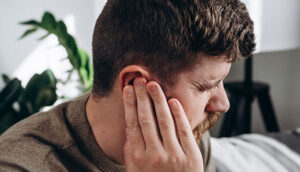 What is tinnitus?
What is tinnitus?
Have you ever experienced a faint ringing in your ears after a loud concert or while you’re trying to fall asleep? The involuntary perception of ringing or other noises in the absence of sound is called tinnitus (tin-nih-tis). People with tinnitus most commonly describe the sound as a high-pitched ringing, however, the sound may vary across individuals. Tinnitus has also been described as hissing, buzzing, static, whooshing, cicada noise, and crackling. It can be heard in one ear, both ears, or be perceived as coming from inside your head.
What causes tinnitus?
There is not one single cause of tinnitus. In fact, a combination of medical conditions, lifestyle choices, etc. can cause tinnitus to develop or worsen. One of the most common causes of tinnitus is frequent exposure to loud or excessive noise. In this situation, the auditory system becomes damaged, which triggers the tinnitus to occur. The tinnitus may last a few hours, a day, or possibly become a permanent, daily occurrence. The tinnitus is typically accompanied by hearing loss, which may be temporary, worsen gradually over time, or occur suddenly. Hearing loss and tinnitus caused by exposure to loud sound can be prevented by consistently wearing hearing protection around hazardous levels of noise. Hearing loss and tinnitus caused by loud sounds are permanent and precautions should be taken to avoid exposure.
In addition to noise exposure, prevalence of tinnitus also increases with age and hearing loss. It can also be caused by head trauma, high blood pressure, medications, TMJ (temporomandibular joint disorder), Meniere’s disease, middle or inner ear infections, benign growths, among many other conditions.
How common is it to have tinnitus?
Most people have experienced tinnitus at least once in their life. Typically the duration of tinnitus is short and does not occur on a frequent basis. Although tinnitus is very common and is usually not a serious medical issue, it can be debilitating to those who experience it every day. The presence of tinnitus can also be a sign of an underlying medical condition, which warrants a visit with your family physician.
When should I see the doctor?
It is important to keep in mind that tinnitus itself is not a medical condition. Instead, it is a symptom of an underlying medical issue and/or a side effect of a medication. If any of the following are true regarding your tinnitus, consider making an appointment with your primary care physician or ear nose and throat (ENT) doctor:
- The tinnitus started after a head injury or illness
- Following exposure to excessive noise or acoustic trauma
- Tinnitus is synchronized with your pulse
- You also experience dizziness
- One or both ears feel “full”
- You have difficulty hearing or understanding speech
- Your tinnitus is only in one ear or it is significantly louder in one ear
- You have difficulty sleeping
- The tinnitus affects your ability to concentrate or function normally at home, work, etc.
- It becomes annoying or bothersome
- You experience thoughts of self harm due to your tinnitus
Are there treatment options I can do at home?
Unfortunately, there is no cure for most tinnitus due to its elusive nature. There are certain lifestyle changes and environment modifications that can be made to reduce the perception of tinnitus and relief the stress that usually accompanies it. Doctors may recommend limiting use of vasoconstrictors such as nicotine and caffeine, as well as reducing your salt intake. Reducing alcohol consumption may also be recommended. In addition, your doctor may complete a review of your medications to determine if one or more of your prescriptions could be causing tinnitus.
As previously mentioned, tinnitus and stress can be correlated, meaning: periods of high stress may cause your tinnitus to intensify and bothersome tinnitus may cause you more stress. Due to the vicious tinnitus cycle, efforts to reduce stress, such as practicing meditation or yoga, are usually beneficial at reducing the effects of tinnitus.
In addition to stress relief tactics, sleep plays an important role in your tinnitus management. Appropriate levels of sleep on a consistent basis will reduce physical and mental stress. If you have difficulty sleeping because of your tinnitus, try sleeping with a fan or air purifier running. By implementing steady background noise, the brain focuses less on the tinnitus, making it easier to fall asleep. Noise generators are also available at major retailers, which allow you to customize you sleep routine with ocean waves, rain, a crackling fire, etc. If you are not able to manage your tinnitus on your own, an audiologist can help create a treatment plan to relieve your tinnitus.
Can a medical professional help relieve my tinnitus?
After consulting with your primary care physician and/or ENT, an audiologist can help develop a treatment plan that is customized to your exact needs. An audiologist is a doctor who specializes in treating hearing loss, tinnitus, and balance disorders. He or she may test your hearing and ask you to complete questionnaires regarding your tinnitus. After testing, your audiologist will consult with you in depth to find the treatment plan that’s right for you. Treatment options may include one or more of the following:
- Hearing devices, if appropriate
- Ear level tinnitus management
- Sound relaxation therapy
What’s the next step?
If you have tinnitus and would like to learn more, please don’t hesitate to make an appointment. We have an educated and experienced team of ENT’s, audiologists, and physician’s assistants ready to help find the treatment that’s right for you. If you are ready to take the first step of relieving your tinnitus, talk to your family doctor about consulting with an ear nose and throat (ENT) doctor. Our number is 616-994-2770.